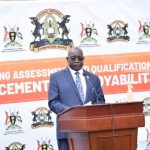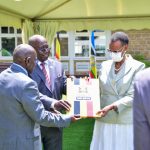The Uganda National Examinations Board (UNEB) has outlined the criteria for a student to receive the Uganda Certificate of Education transcript under the revised curriculum. In the past, a candidate needed to pass at least five subjects in the national examinations, focusing primarily on core subjects such as English, Mathematics, Biology, Chemistry, Physics, Geography, and History.
However, this has changed with the new curriculum that was implemented last year. As the old curriculum is being phased out, UNEB has clarified the requirements for qualifying for the O’Level certificate. According to UNEB, a candidate qualifies for the UCE certificate by achieving a competency level grade of D in at least one subject taken.

Additionally, UNEB has modified the grading system, introducing a new scale that replaces the old one. Previously, students were graded with distinctions, credits, passes, and failures (D1, D2, C3, C4, C5, C6, P7, P8, and F9). This system has now been substituted with letter grades ranging from A to E.
“The method of reporting achievement levels has shifted from the stanine system of 1 to 9 (Distinctions, Credits, Passes, and Fails) previously used in the content-based curriculum to letter grades A, B, C, D, and E. Further details will be provided by the Executive Director in the Results Release Statement. The Transcript (formerly known as the Result Slip) and the certificate will also have changes in how the content is presented,” stated UNEB Chairperson Prof Celestine Obua.
“The Board’s decision to implement the letter grades format was influenced by multiple options available, considering varying degrees of content. The decision was based on the following factors: (i) the report/transcript/certificate must be easy to understand for all stakeholders, and (ii) the descriptors – explanations of the grades’ meanings – should reflect positively on what the certificate holder is capable of,” Obua added.
UNEB’s Executive Director Daniel Odong mentioned that, since the new curriculum is skills-based, it is crucial for science laboratories and workshops to be properly equipped to provide students with sufficient opportunities to develop new knowledge through self-learning.
Sadly, numerous rural and private schools lack these facilities and are also experiencing a shortage of science teachers.
At the same time, UNEB found that some schools were reluctant to embrace the new curriculum, clinging to the old curriculum with the expectation that the Government might revert to the previous system due to the initial challenges faced during the rollout of the curriculum. They were taken aback when the Board published the sample examination papers. These difficulties significantly affected candidates’ performance in science subjects. Nonetheless, the new competency-based curriculum assessment has proven to be effective.




















